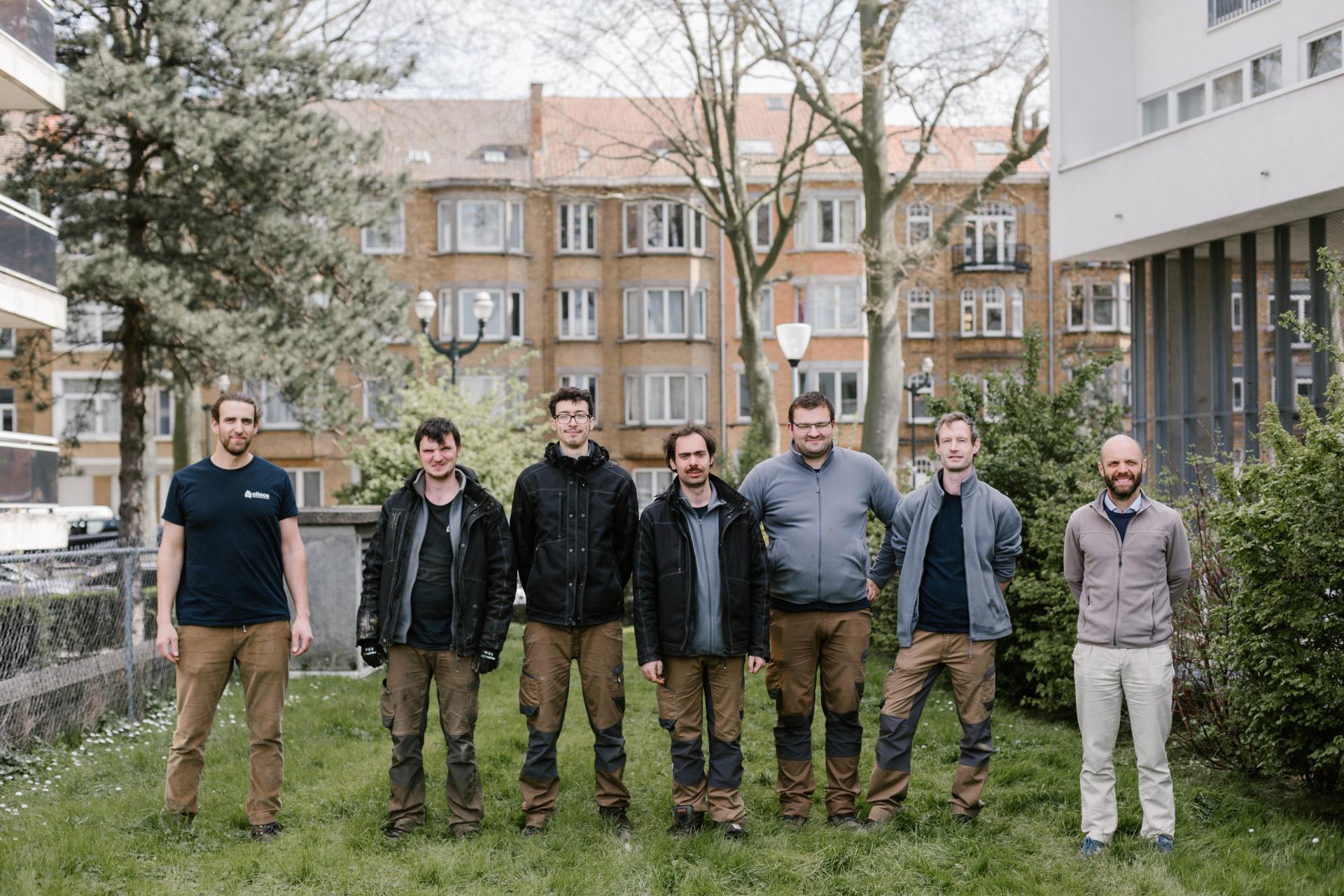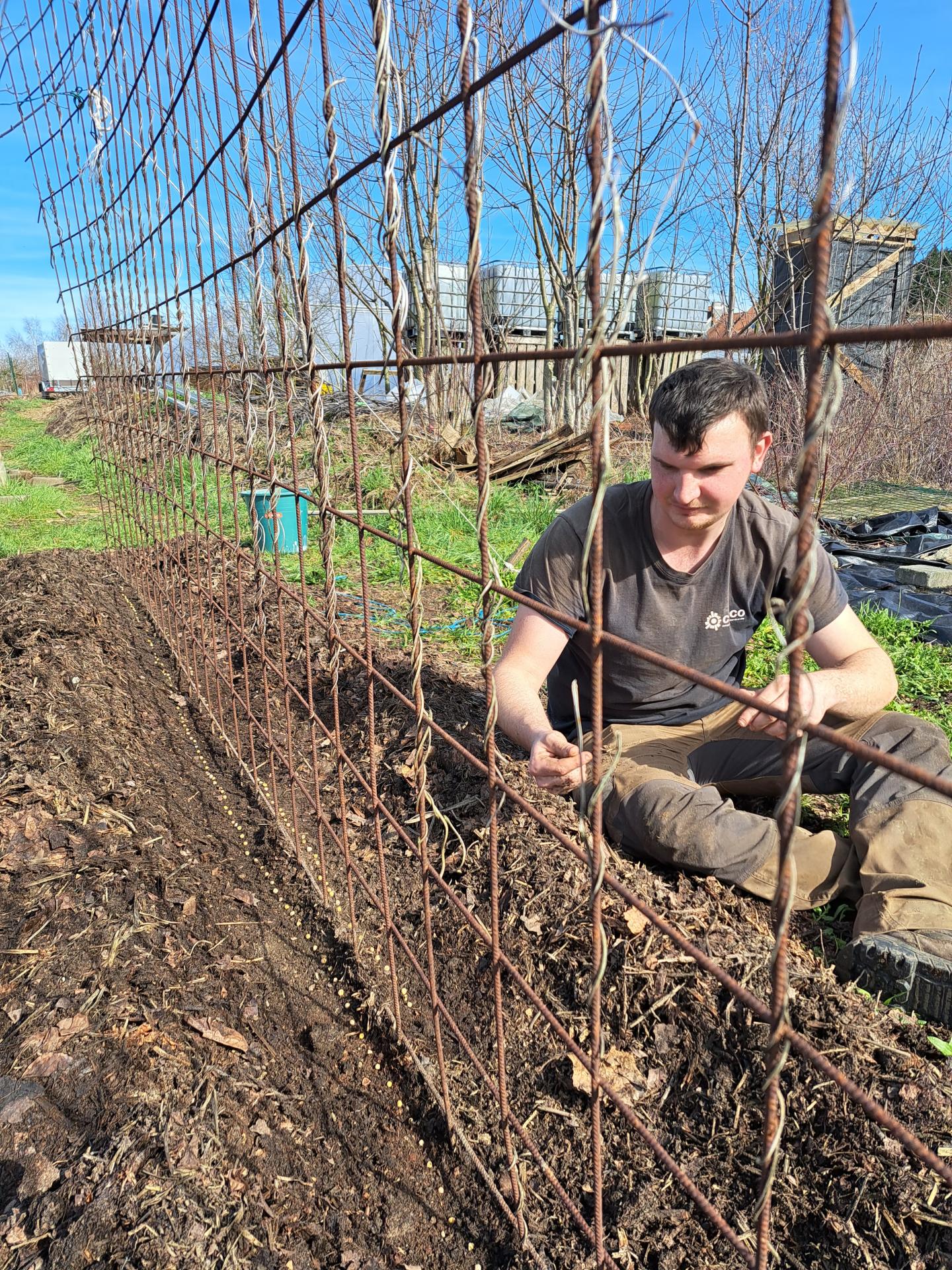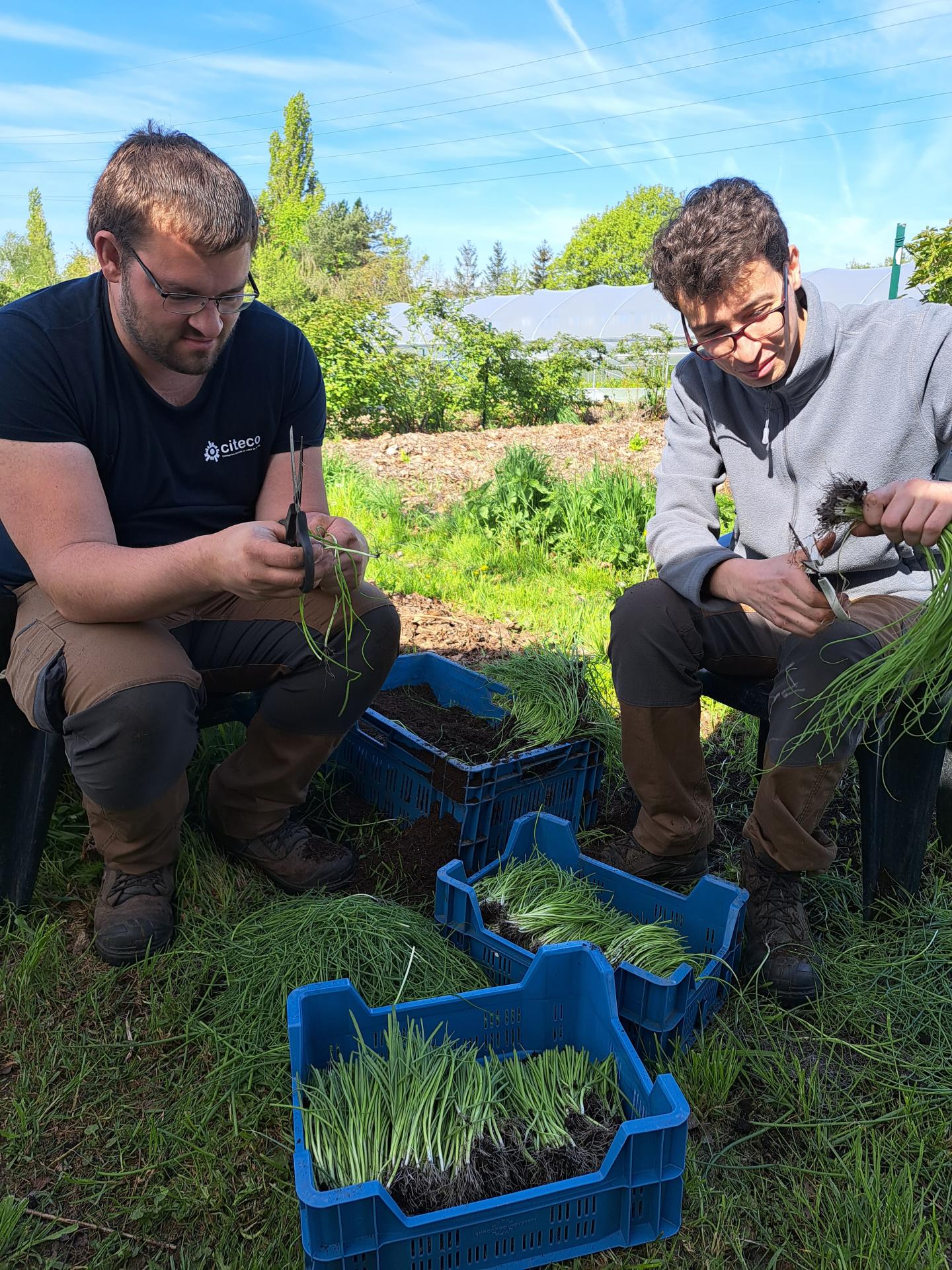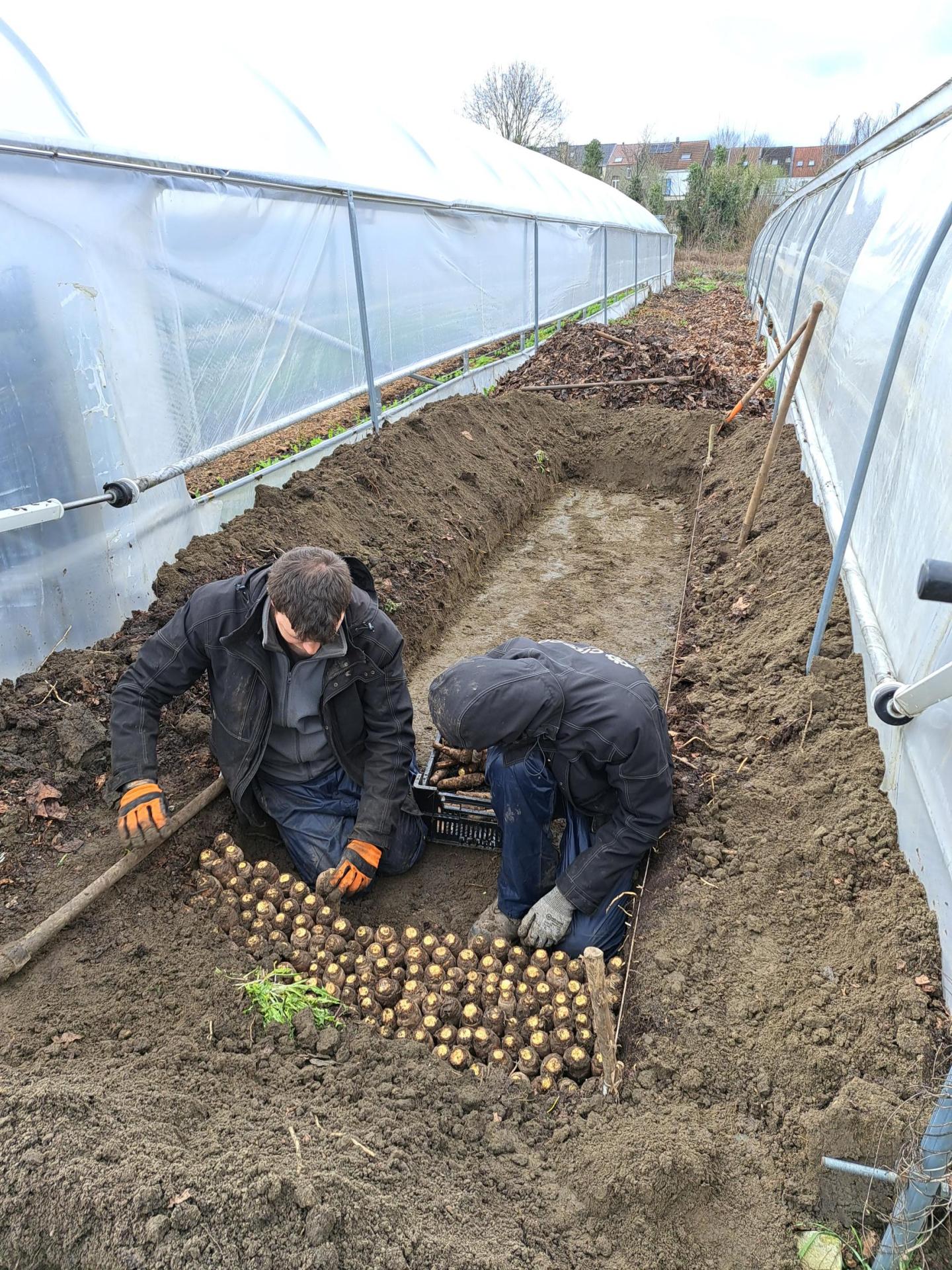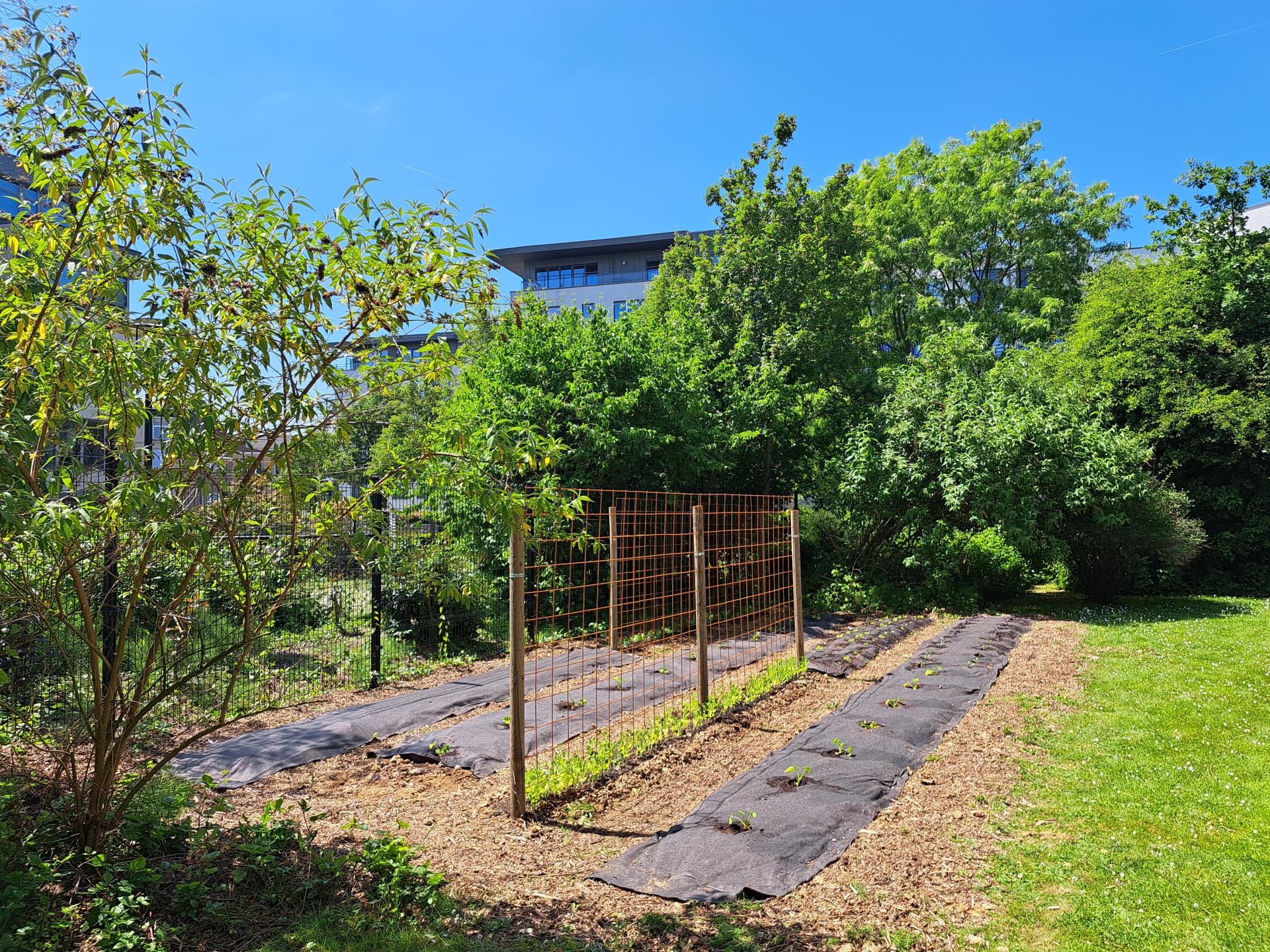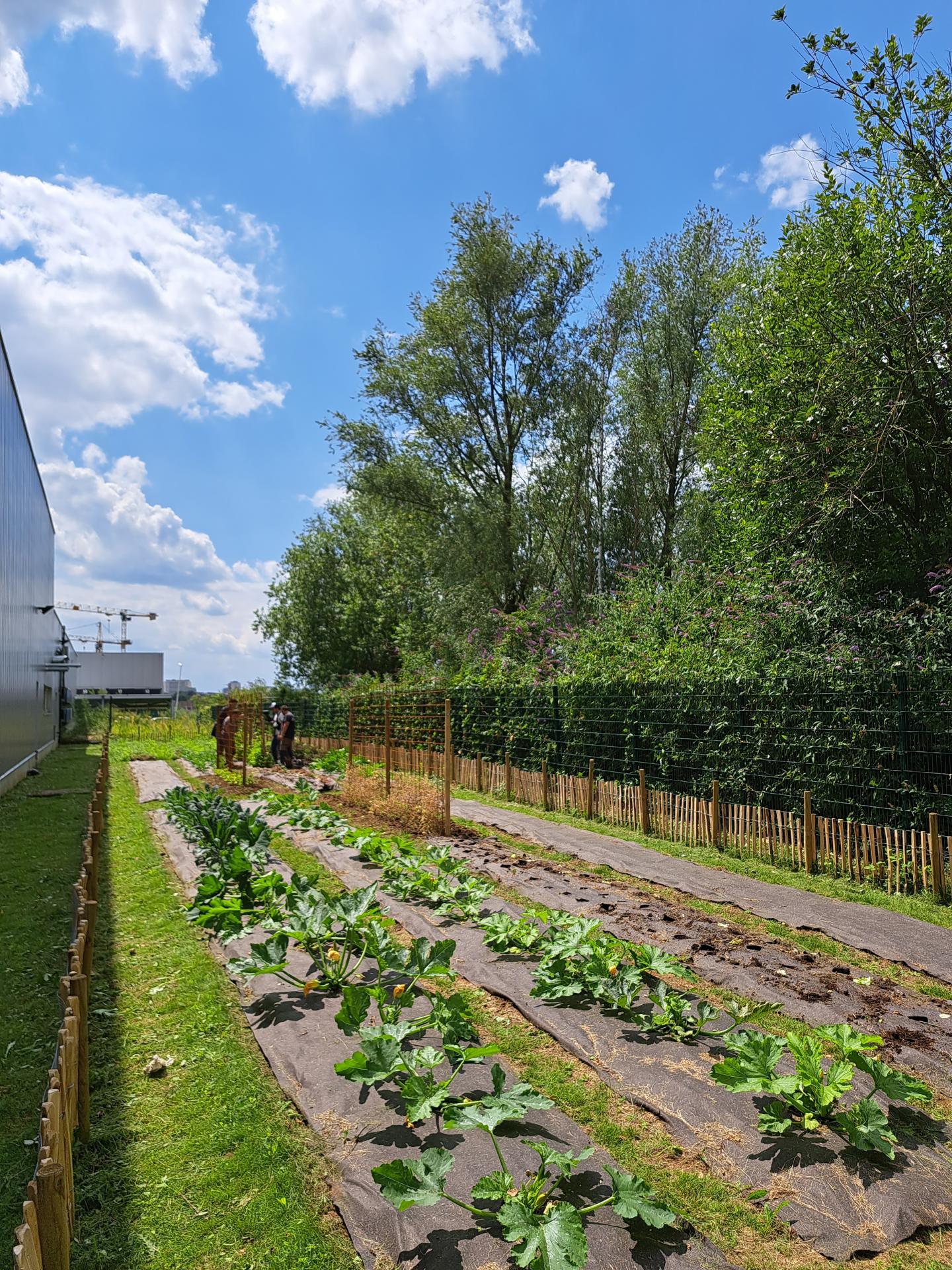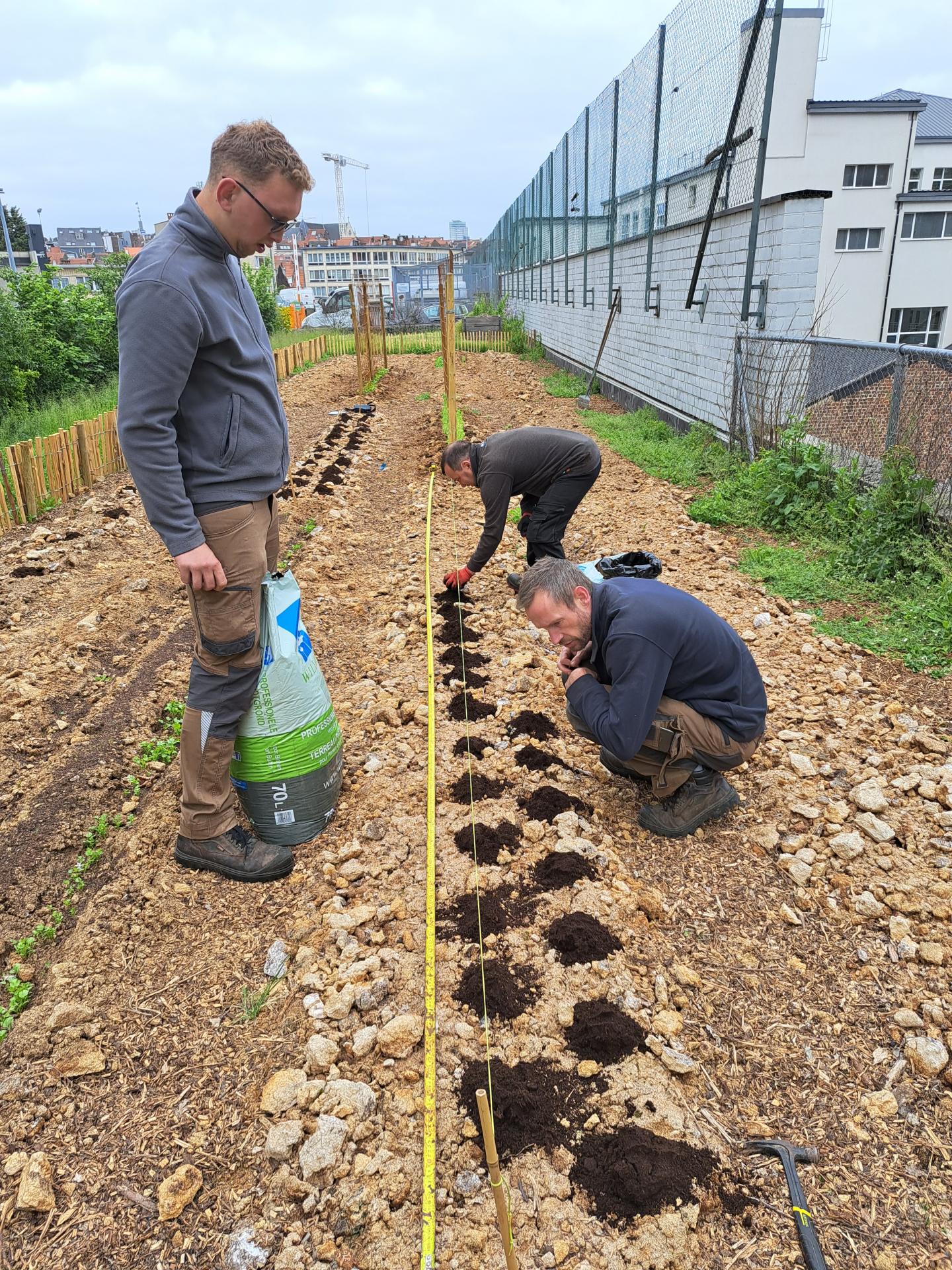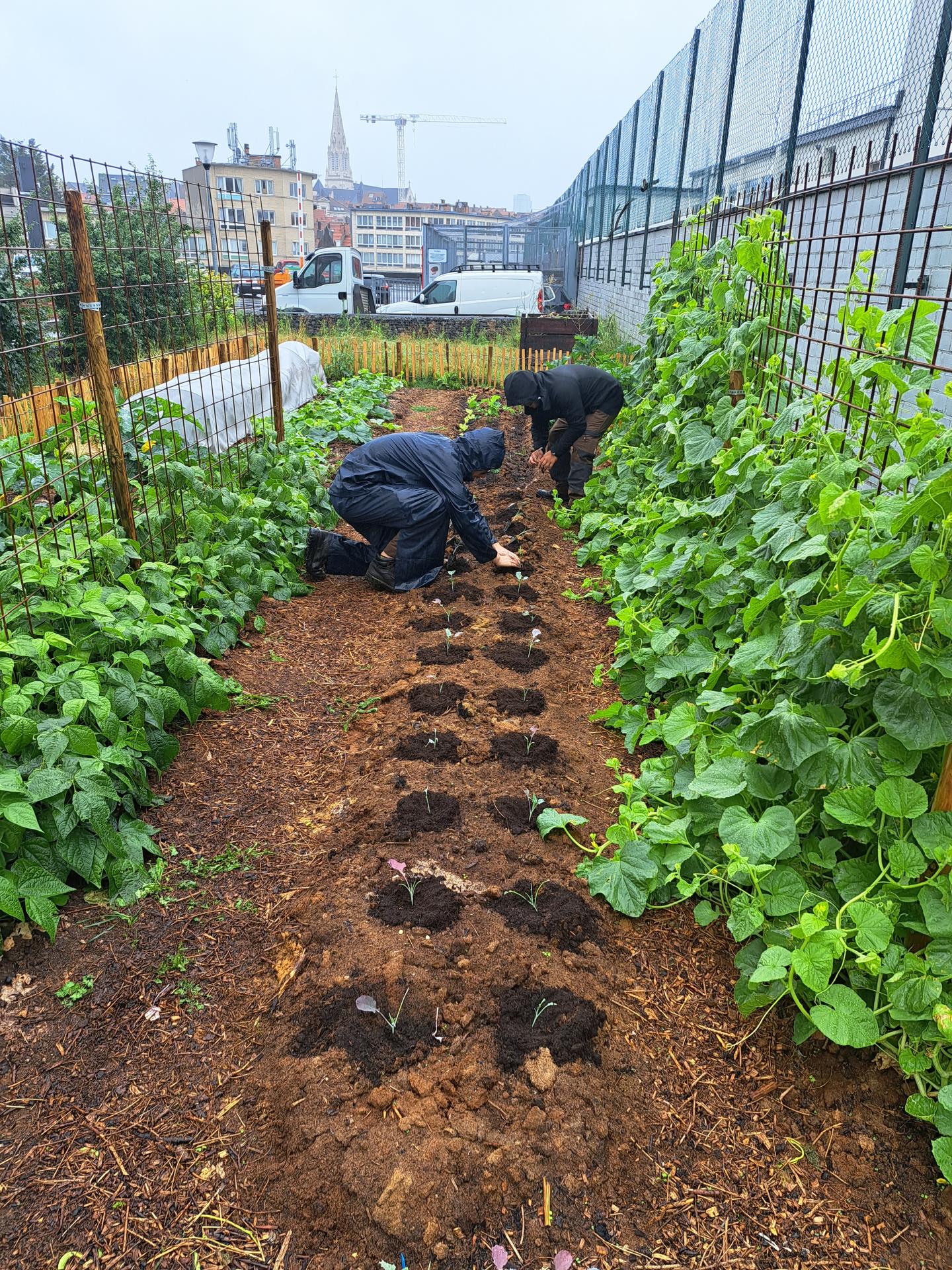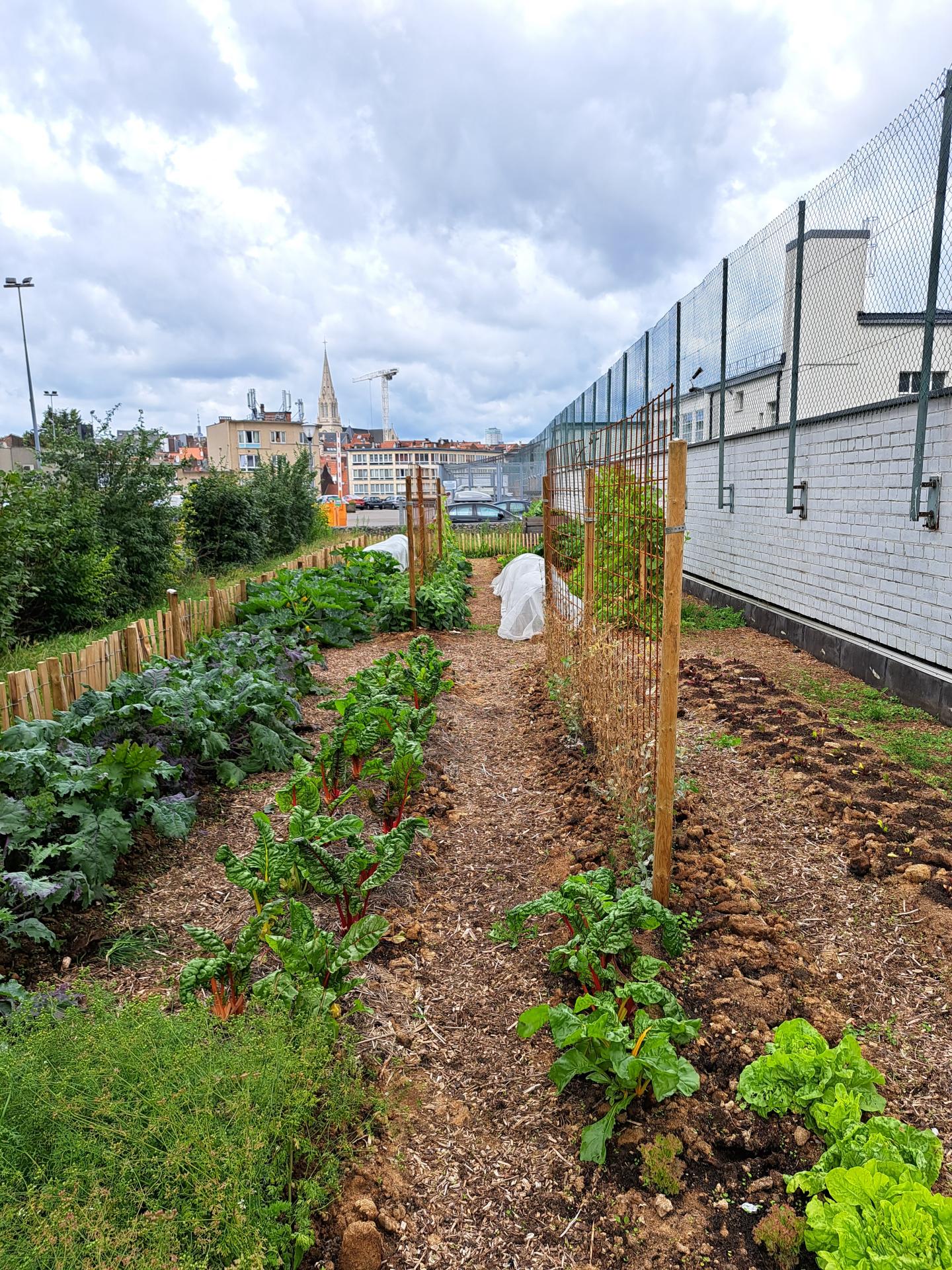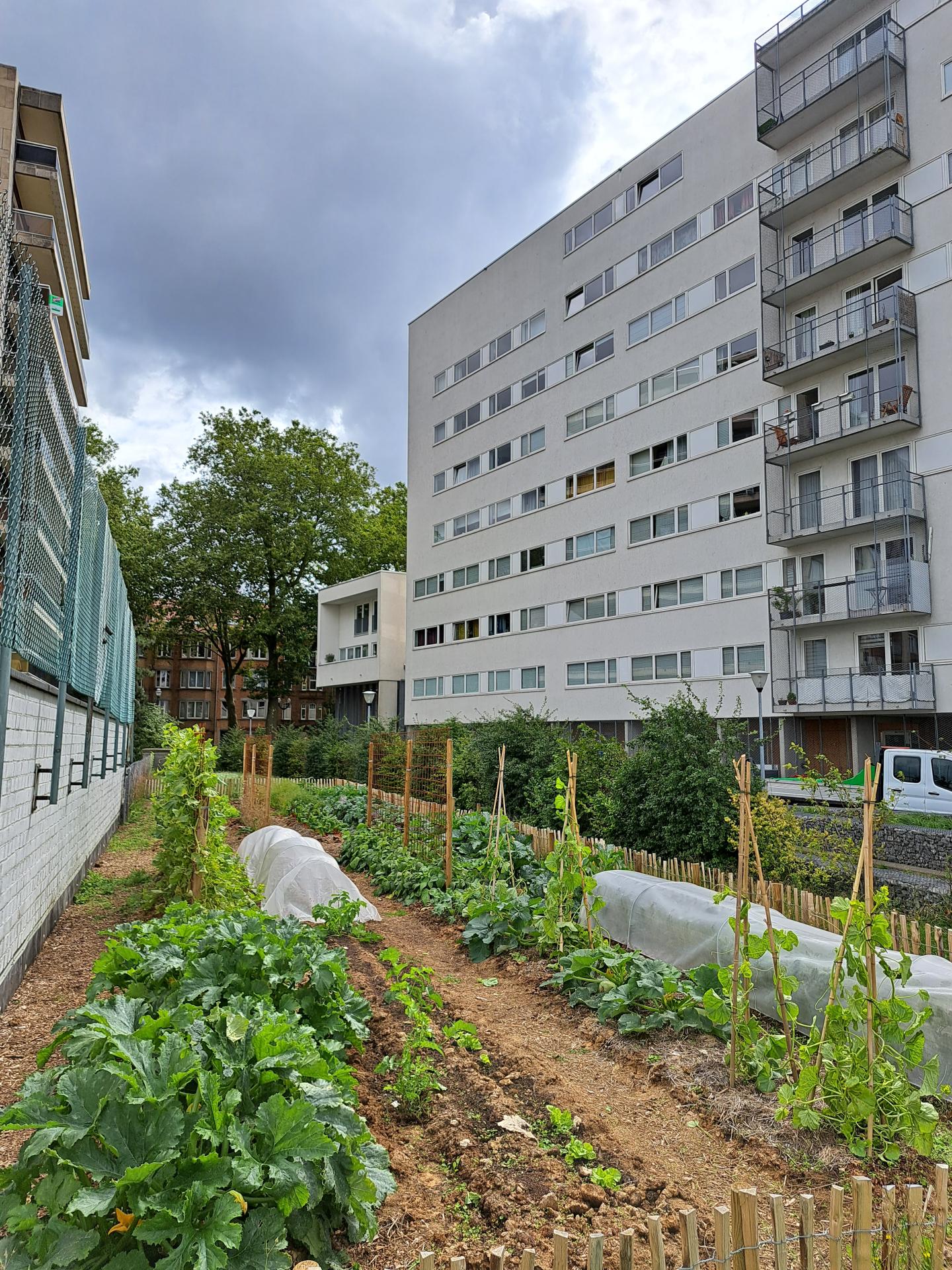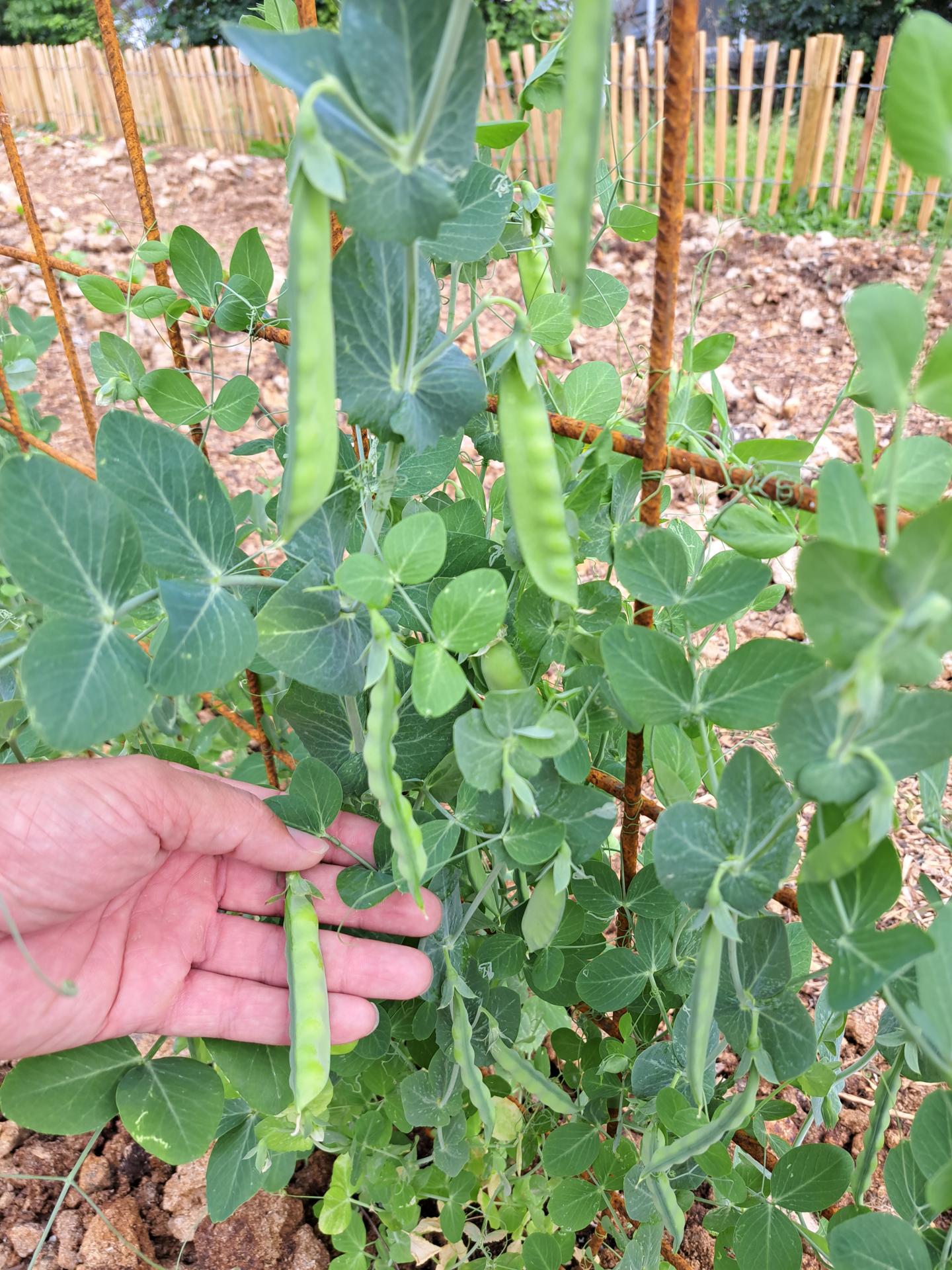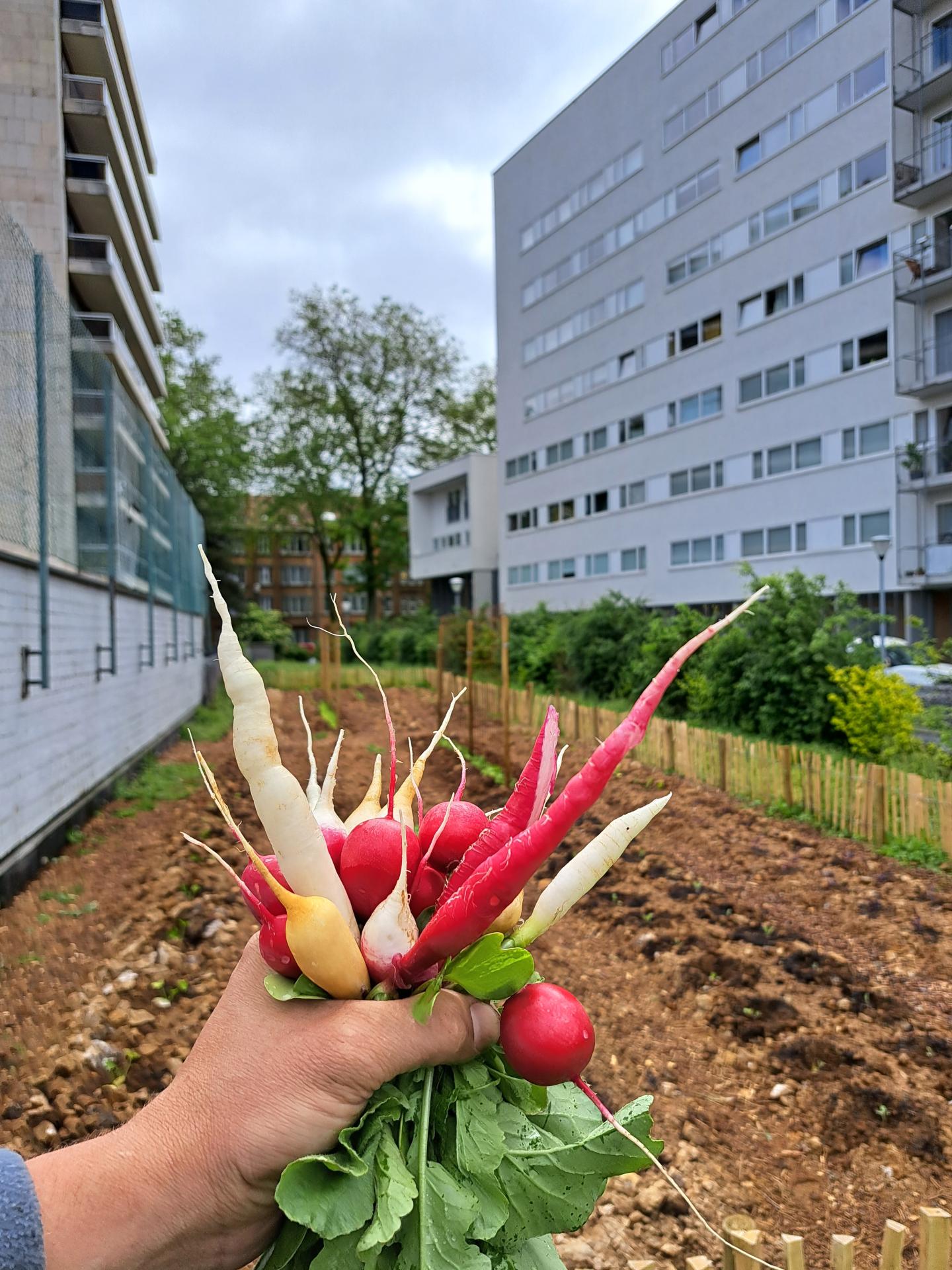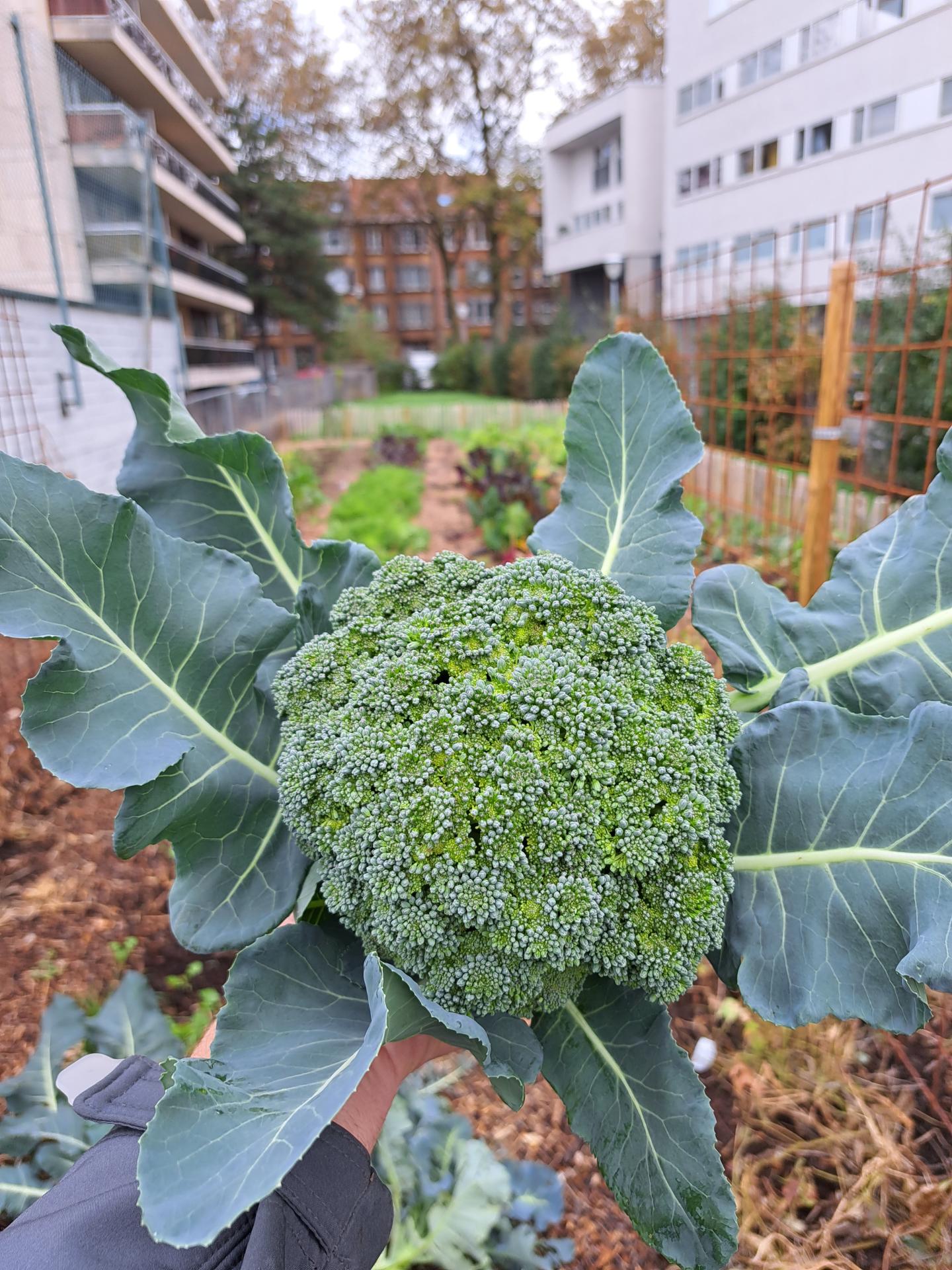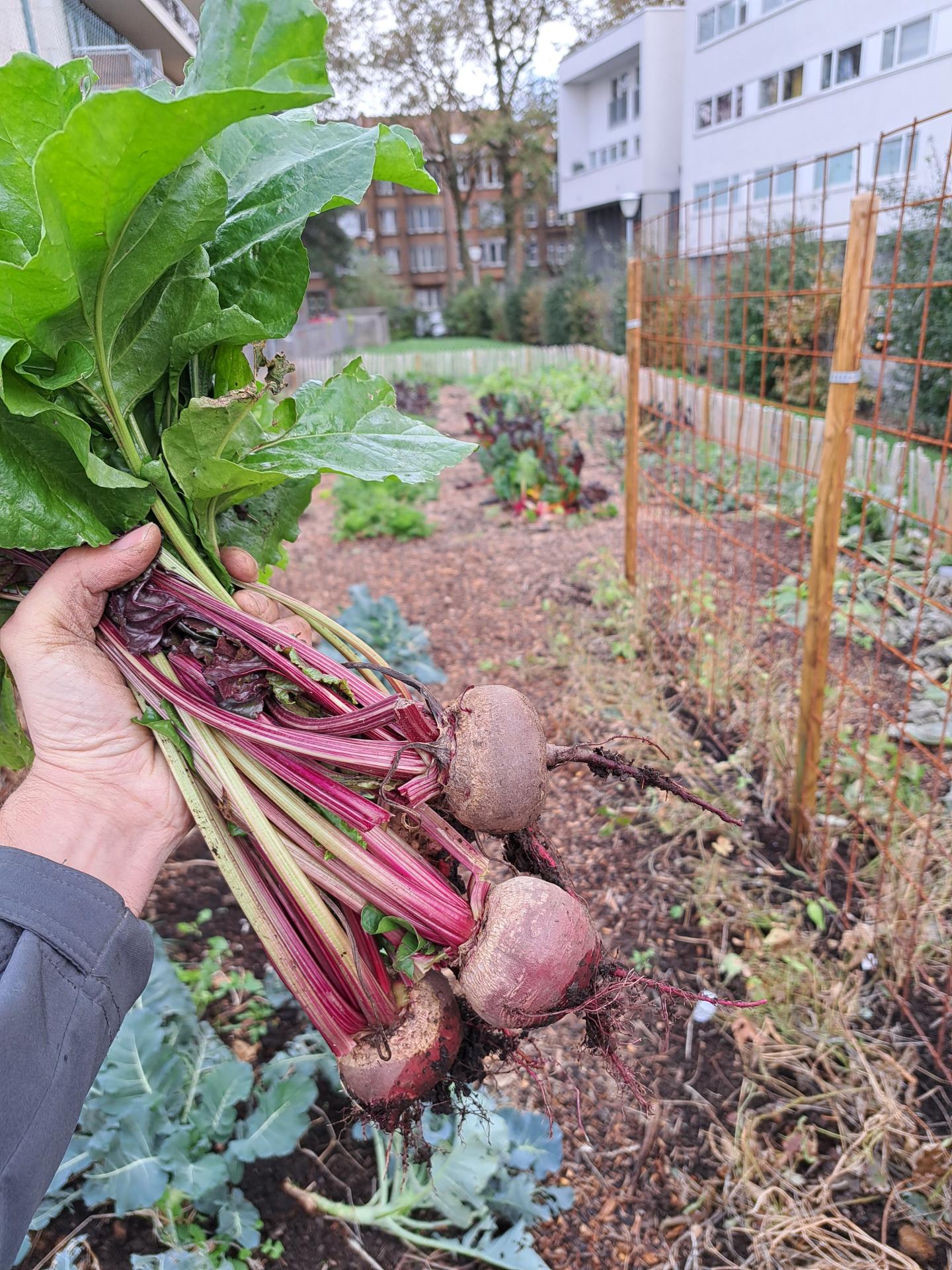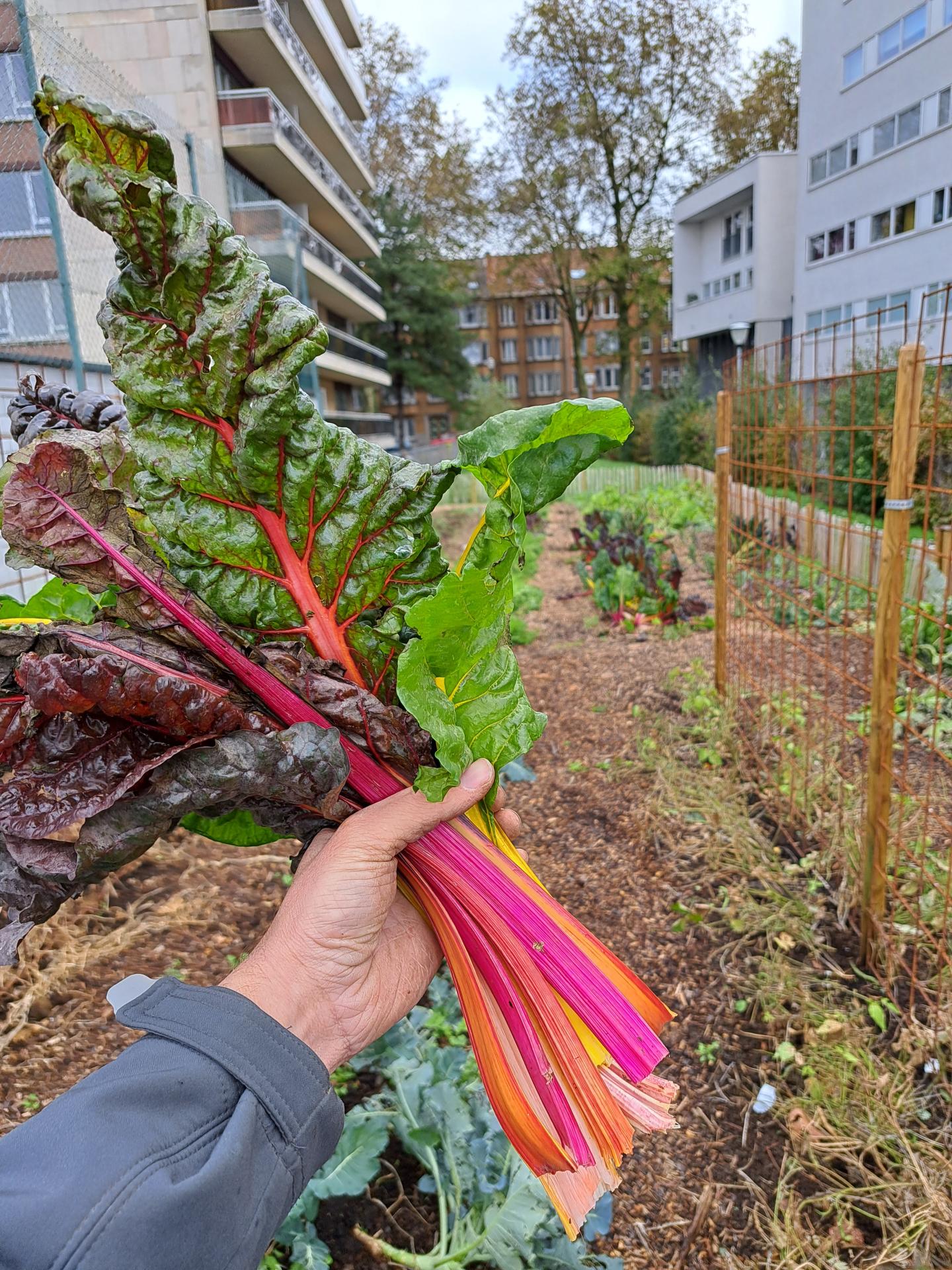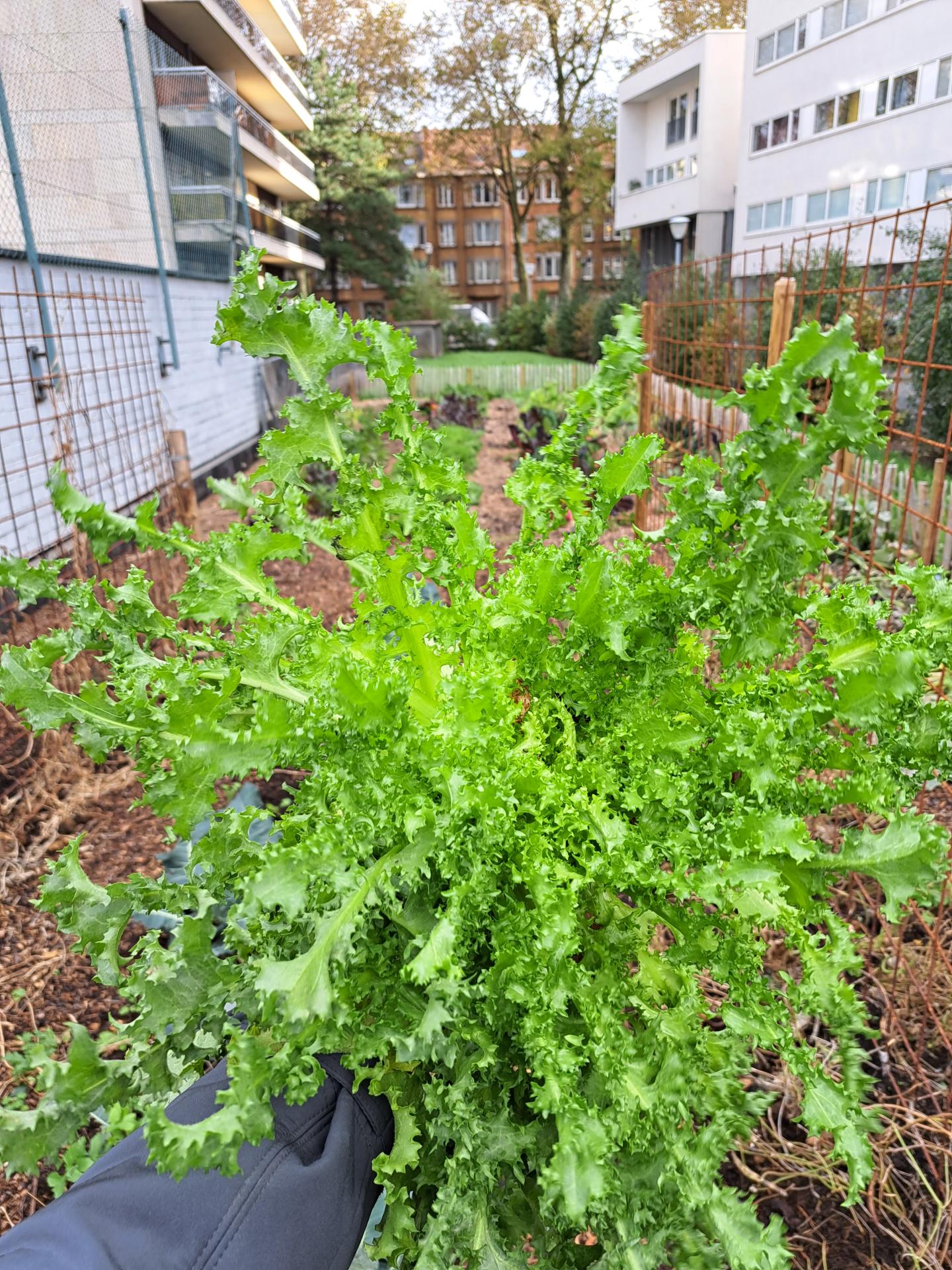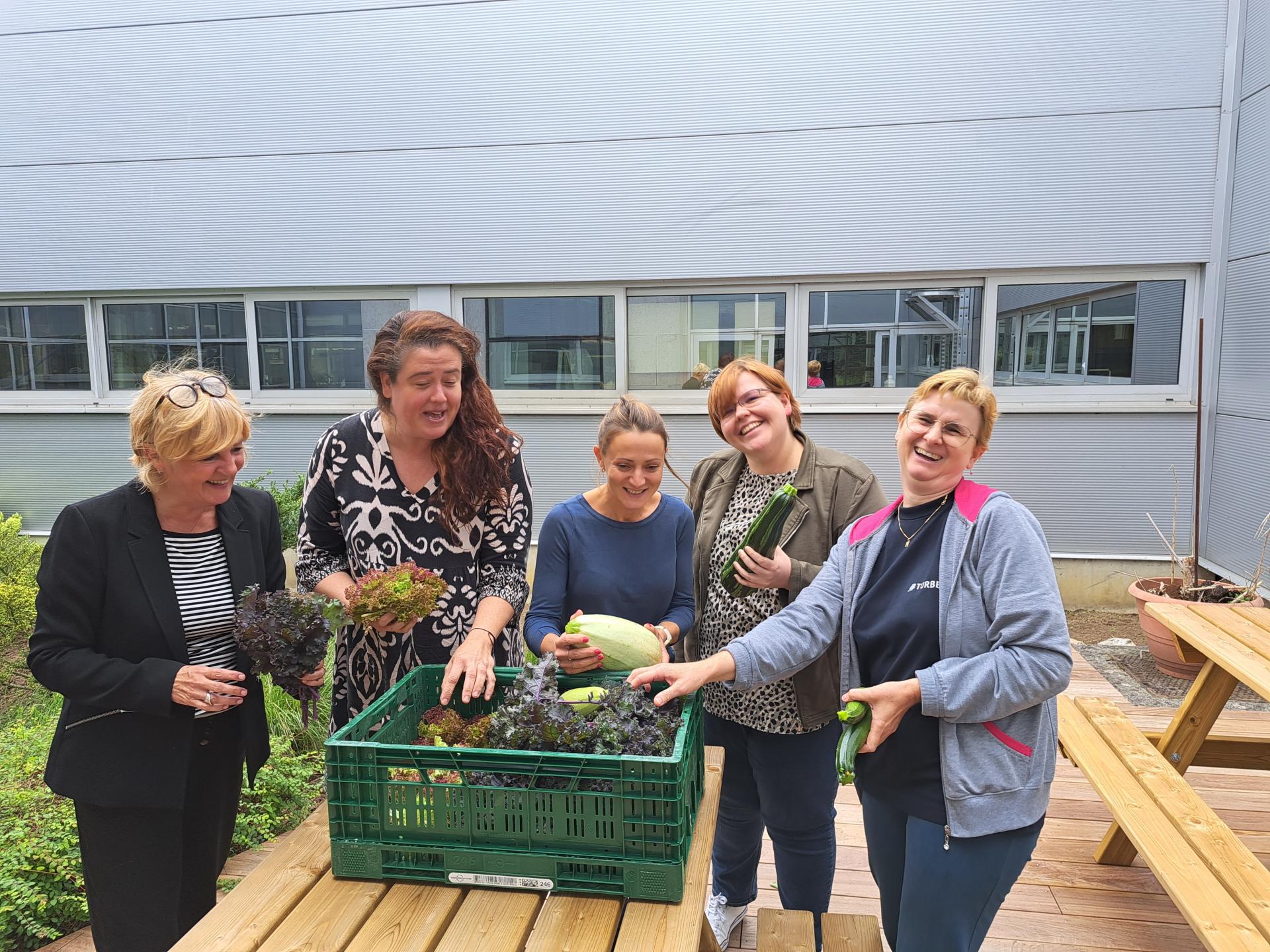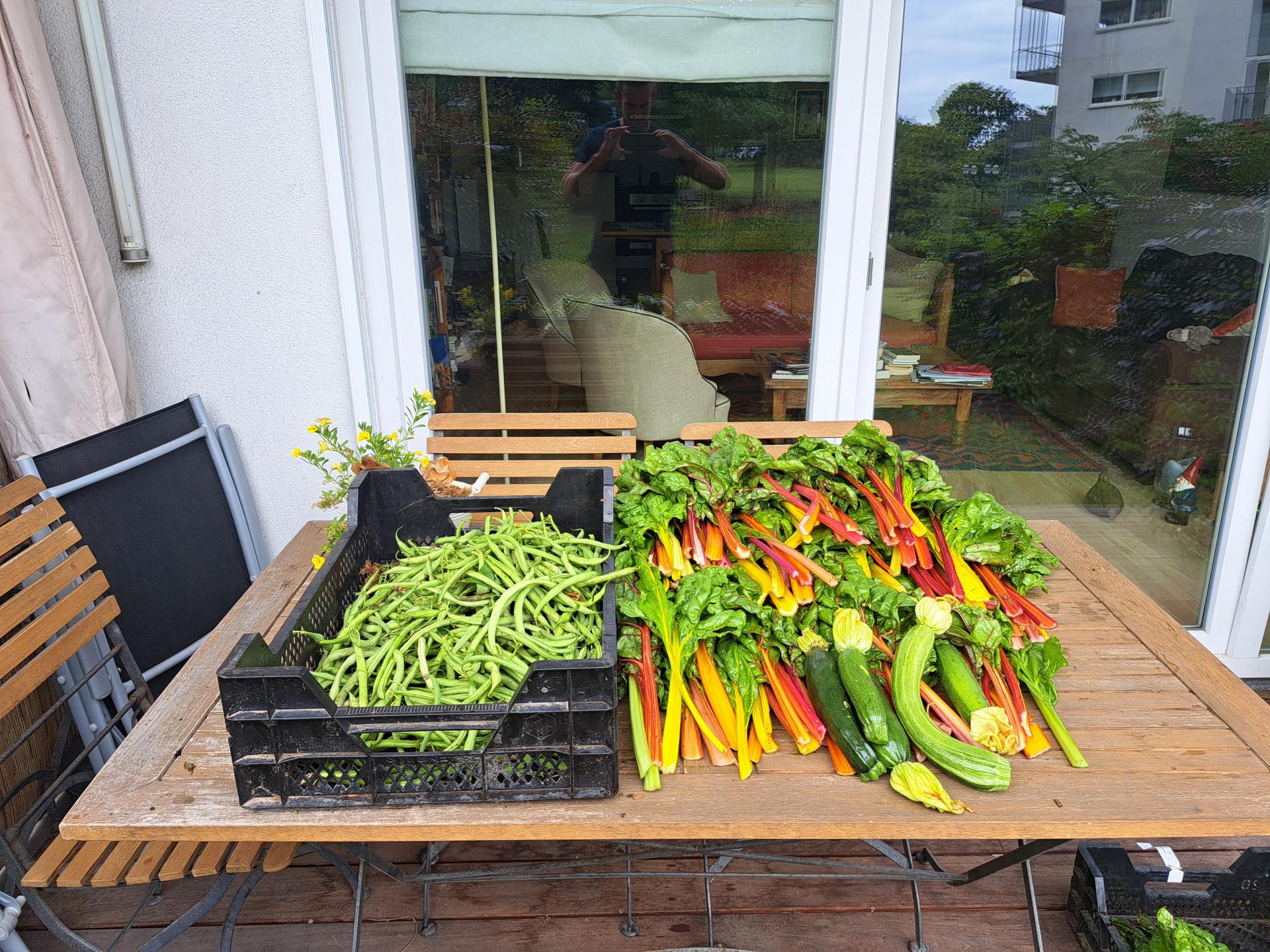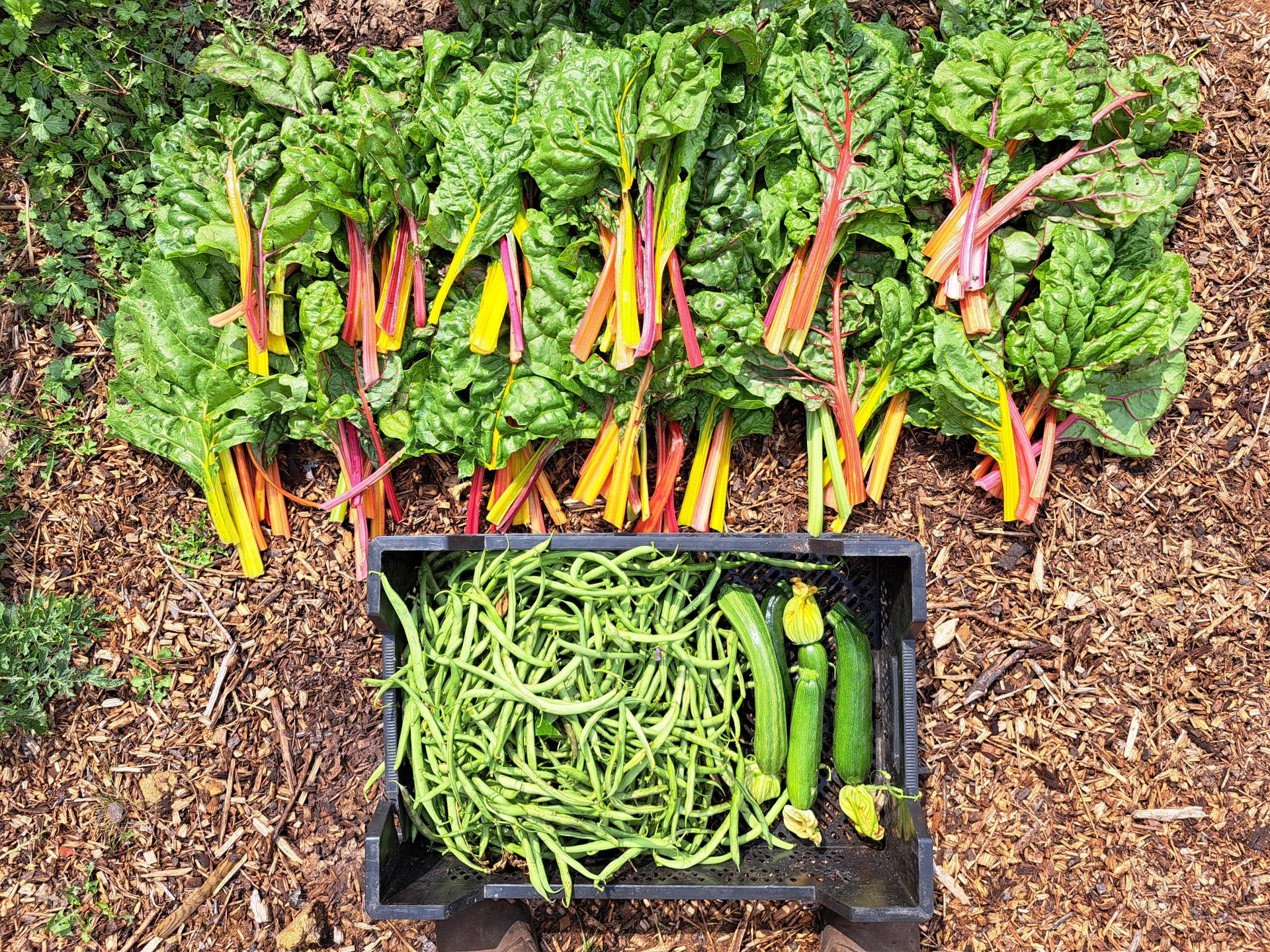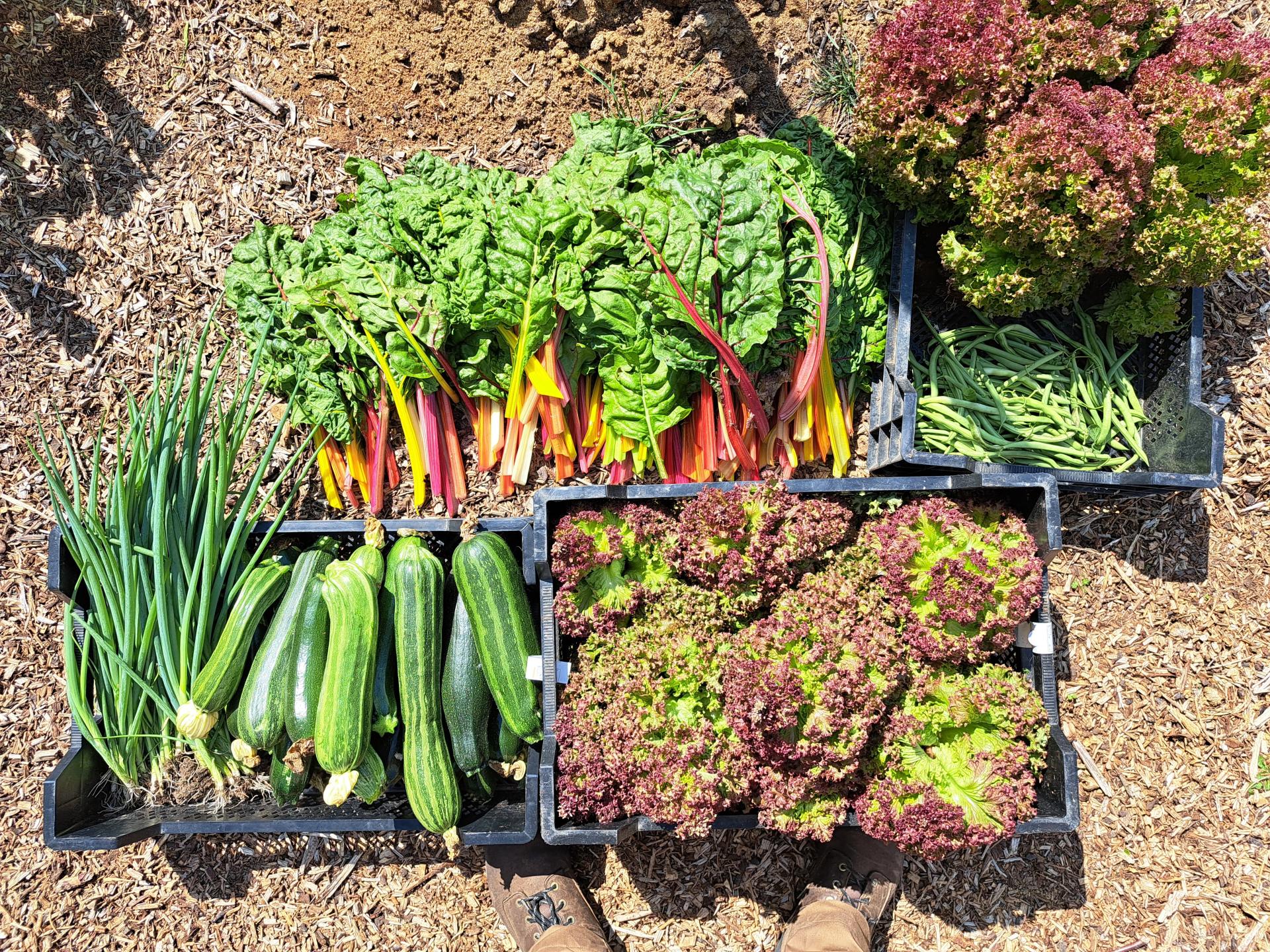The Extraordinary Urban Market Gardeners
Basic information
Project Title
The Extraordinary Urban Market Gardeners
Full project title
The Extraordinary Urban Market Gardeners (Les Maraichers Urbains Extraordinaires - MUE)
Category
Reconnecting with nature
Project Description
The Extraordinary Urban Market Gardeners is a project with a simple goal: to turn neglected urban green spaces into vegetable gardens for local food production. What makes this project exceptional is that it's carried out by people with disabilities, promoting social inclusion for these vulnerable individuals. Additionally, the project raises awareness in the community about food production, making this essential knowledge accessible once more, a know-how often forgotten within a few generations
Geographical Scope
Regional
Project Region
The project is emplemented in 3 commune of Brussels region : Schaerbeek, Haren and Auderghem., Belgium
Urban or rural issues
Mainly urban
Physical or other transformations
It refers to other types of transformations (soft investment)
EU Programme or fund
No
Description of the project
Summary
The Extraordinary Urban Market Gardeners (MUE) is an initiative by Citeco, an non-profit organization based in Brussels. It aims to create rewarding jobs for people with disabilities. Thanks to a subsidy from the Brussels Regional Government, The Extraordinary Urban Market Gardeners, started in 2023, are transforming green spaces we maintain into productive vegetable gardens.
After months of work, we successfully converted 500 sqm of underutilized green spaces into vegetable gardens in three sites across Brussels. Workers with disabilities employ innovative living soil cultivation methods, which involve mulching to create a living soil, reducing strenuous soil work, weed management, and water usage.
This project addresses the need for food self-sufficiency in a region prone to crises, such as climate change and international conflicts , raising concerns about food shortages. The Extraordinary Urban Market Gardeners aim to become a key player in the regional food supply chain, promoting food self-sufficiency in Brussels.
“MUE” have transformed urban spaces into places of food production, promoting the regeneration of natural ecosystems, raising awareness, and fostering social inclusion, aligning with the category of "Reconnecting with Nature '' of the New European Bauhaus 2024.
In the long term, “MUE” will enhance the quality of life for individuals and communities by creating a more sustainable urban environment, promoting social inclusion, and contributing to food self-sufficiency. It will also serve as an inspiring model for other similar initiatives, contributing to a more resilient and sustainable city for the future.
“MUE” proactively address specific challenges in Brussels, such as food self-sufficiency, climate change, social inclusion, urban biodiversity preservation, community connectivity, and environmental education. It represents a local solution to global issues and contributes to a more resilient and sustainable city.
After months of work, we successfully converted 500 sqm of underutilized green spaces into vegetable gardens in three sites across Brussels. Workers with disabilities employ innovative living soil cultivation methods, which involve mulching to create a living soil, reducing strenuous soil work, weed management, and water usage.
This project addresses the need for food self-sufficiency in a region prone to crises, such as climate change and international conflicts , raising concerns about food shortages. The Extraordinary Urban Market Gardeners aim to become a key player in the regional food supply chain, promoting food self-sufficiency in Brussels.
“MUE” have transformed urban spaces into places of food production, promoting the regeneration of natural ecosystems, raising awareness, and fostering social inclusion, aligning with the category of "Reconnecting with Nature '' of the New European Bauhaus 2024.
In the long term, “MUE” will enhance the quality of life for individuals and communities by creating a more sustainable urban environment, promoting social inclusion, and contributing to food self-sufficiency. It will also serve as an inspiring model for other similar initiatives, contributing to a more resilient and sustainable city for the future.
“MUE” proactively address specific challenges in Brussels, such as food self-sufficiency, climate change, social inclusion, urban biodiversity preservation, community connectivity, and environmental education. It represents a local solution to global issues and contributes to a more resilient and sustainable city.
Key objectives for sustainability
The main objectives of The Extraordinary Urban Market Gardeners in terms of sustainability are as follows:
Promote Environmental Sustainability: The Extraordinary Urban Market Gardeners aim to reduce its environmental impact by adopting no-till, living soil (MSV) farming practices. These methods preserve soil health, minimize waste, reduce the need for irrigation, and promote biodiversity. These objectives have been achieved by transforming gardens into productive vegetable plots, using mulch from gardening waste, and raising awareness among workers and the community about the importance of regenerating natural ecosystems.
Foster Social Inclusion and Sustainable Employment: The project's mission is to create meaningful employment opportunities for individuals with disabilities. By offering work in urban agriculture, The Extraordinary Urban Market Gardeners has achieved this goal by creating working hours for disabled workers and facilitating their social integration.
Enhance Local Food Security: The Extraordinary Urban Market Gardeners address the need for local food security by producing a variety of local vegetables throughout the year. This helps reduce dependence on external food supplies and ensures access to healthy food for the local population.
The Extraordinary Urban Market Gardeners can serve as a sustainability exemple because it combines the promotion of environmentally friendly practices, the creation of inclusive jobs, the assurance of local food security, and raising awareness about regenerating urban spaces. It demonstrates how urban agriculture can be a holistic solution to address multiple contemporary challenges while strengthening the connection between citizens, nature, and sustainability.
Promote Environmental Sustainability: The Extraordinary Urban Market Gardeners aim to reduce its environmental impact by adopting no-till, living soil (MSV) farming practices. These methods preserve soil health, minimize waste, reduce the need for irrigation, and promote biodiversity. These objectives have been achieved by transforming gardens into productive vegetable plots, using mulch from gardening waste, and raising awareness among workers and the community about the importance of regenerating natural ecosystems.
Foster Social Inclusion and Sustainable Employment: The project's mission is to create meaningful employment opportunities for individuals with disabilities. By offering work in urban agriculture, The Extraordinary Urban Market Gardeners has achieved this goal by creating working hours for disabled workers and facilitating their social integration.
Enhance Local Food Security: The Extraordinary Urban Market Gardeners address the need for local food security by producing a variety of local vegetables throughout the year. This helps reduce dependence on external food supplies and ensures access to healthy food for the local population.
The Extraordinary Urban Market Gardeners can serve as a sustainability exemple because it combines the promotion of environmentally friendly practices, the creation of inclusive jobs, the assurance of local food security, and raising awareness about regenerating urban spaces. It demonstrates how urban agriculture can be a holistic solution to address multiple contemporary challenges while strengthening the connection between citizens, nature, and sustainability.
Key objectives for aesthetics and quality
The key objectives of The Extraordinary Urban Market Gardeners in terms of aesthetics, quality of experience for people, and cultural benefits are as follows:
Enhance Aesthetics in Urban Spaces: The Extraordinary Urban Market Gardeners aim to transform underutilized urban areas into beautiful and productive gardens, improving the overall visual appeal of these spaces. This objective has been achieved through the creation of lush vegetable plots that add greenery, colors, and vibrancy to the urban landscape.
Cultural Enrichment: The project celebrates local food culture by cultivating a variety of regional vegetables. This objective has been achieved by growing and promoting traditional and culturally relevant products, thereby enriching the cultural heritage of the local community.
Quality Experiences: The Extraordinary Urban Market Gardeners aim to create natural, productive, and inclusive spaces where every project participant can find their place, regardless of their backgrounds or abilities. The project aspires to be an example of resilience, contributing to a sustainable transformation of our cities while also offering a high-quality experience to participants, which enhances its acceptance within society.
The Extraordinary Urban Market Gardeners can serve as an example in this context because it successfully combines aesthetic improvements in urban spaces, cultural enrichment through food diversity, and the provision of quality experiences for all community members. It demonstrates how urban agriculture can contribute to the embellishment and cultural richness of a city while ensuring inclusivity and accessibility for everyone.
Enhance Aesthetics in Urban Spaces: The Extraordinary Urban Market Gardeners aim to transform underutilized urban areas into beautiful and productive gardens, improving the overall visual appeal of these spaces. This objective has been achieved through the creation of lush vegetable plots that add greenery, colors, and vibrancy to the urban landscape.
Cultural Enrichment: The project celebrates local food culture by cultivating a variety of regional vegetables. This objective has been achieved by growing and promoting traditional and culturally relevant products, thereby enriching the cultural heritage of the local community.
Quality Experiences: The Extraordinary Urban Market Gardeners aim to create natural, productive, and inclusive spaces where every project participant can find their place, regardless of their backgrounds or abilities. The project aspires to be an example of resilience, contributing to a sustainable transformation of our cities while also offering a high-quality experience to participants, which enhances its acceptance within society.
The Extraordinary Urban Market Gardeners can serve as an example in this context because it successfully combines aesthetic improvements in urban spaces, cultural enrichment through food diversity, and the provision of quality experiences for all community members. It demonstrates how urban agriculture can contribute to the embellishment and cultural richness of a city while ensuring inclusivity and accessibility for everyone.
Key objectives for inclusion
The main objectives of The Extraordinary Urban Market Gardeners in terms of inclusion are :
Universal Accessibility and Affordability: The Extraordinary Urban Market Gardeners aim to create universally accessible and affordable gardening spaces for everyone. These goals have been achieved by designing universally accessible garden plots, offering affordable rates for participation, and promoting the integration of individuals with disabilities.
Inclusive Employment: The project's mission is to create meaningful employment opportunities for people with disabilities. This objective has been accomplished by providing work opportunities in urban agriculture, adapting tasks to individual capabilities, and promoting social integration.
Community Participation: The Extraordinary Urban Market Gardeners encourage active community participation by making environmental preservation and restoration a shared task. Local residents have been involved in the design and harvesting of the gardens, contributing to a sense of belonging.
New Societal Models: The Extraordinary Urban Market Gardeners contribute to a new model of inclusive society by demonstrating how people with disabilities can actively participate in economic and community activities and by highlighting the value of diversity.
The Extraordinary Urban Market Gardeners can serve as an exemplary model in this context because it successfully achieves inclusion on multiple levels. It ensures the accessibility and affordability of spaces and activities, creates inclusive employment opportunities, encourages community participation, and contributes to the evolution of new inclusive societal models. It demonstrates how urban agriculture can act as a catalyst for a more inclusive society.
Universal Accessibility and Affordability: The Extraordinary Urban Market Gardeners aim to create universally accessible and affordable gardening spaces for everyone. These goals have been achieved by designing universally accessible garden plots, offering affordable rates for participation, and promoting the integration of individuals with disabilities.
Inclusive Employment: The project's mission is to create meaningful employment opportunities for people with disabilities. This objective has been accomplished by providing work opportunities in urban agriculture, adapting tasks to individual capabilities, and promoting social integration.
Community Participation: The Extraordinary Urban Market Gardeners encourage active community participation by making environmental preservation and restoration a shared task. Local residents have been involved in the design and harvesting of the gardens, contributing to a sense of belonging.
New Societal Models: The Extraordinary Urban Market Gardeners contribute to a new model of inclusive society by demonstrating how people with disabilities can actively participate in economic and community activities and by highlighting the value of diversity.
The Extraordinary Urban Market Gardeners can serve as an exemplary model in this context because it successfully achieves inclusion on multiple levels. It ensures the accessibility and affordability of spaces and activities, creates inclusive employment opportunities, encourages community participation, and contributes to the evolution of new inclusive societal models. It demonstrates how urban agriculture can act as a catalyst for a more inclusive society.
Results in relation to category
Project Results:
Sustainable Vegetable Production: Production of healthy, local vegetables while applying sustainable methods, promoting biodiversity and soil regeneration.
Reduced Ecological Footprint: Decreased ecological footprint by reducing reliance on transportation for food supply, promoting environmentally-friendly cultivation practices, and encouraging material reuse for mulch.
Enhanced Food Resilience: The project improves the community's food resilience by producing local food.
Project Consequences:
Reconnection to Nature: The project allowed the community to reconnect with nature by transforming urban spaces into gardens and inviting residents to participate in food production.
Social Inclusion: Direct beneficiaries of the project gained meaningful employment opportunities, enhancing personal development and social integration.
Food Sovereignty: The project contributes to strengthening food sovereignty by reclaiming forgotten expertise and establishing a direct link between producers and consumers.
Project Impacts:
Biodiversity Preservation: By practicing living soil farming and avoiding pesticide use, the project contributes to preventing biodiversity loss.
Improved Quality of Life: Direct beneficiaries of the project have seen an improved quality of life through employment opportunities, pride in participating in a sustainable project, and engagement in outdoor activities.
Environmental Awareness: The project has raised the community's awareness of environmental sustainability, nature conservation, and responsible food production.
Benefits for Direct and Indirect Beneficiaries:
Direct Beneficiaries: Workers with disabilities have access to inclusive and meaningful employment, boosting their self-esteem and active participation in society.
Indirect Beneficiaries: The local community benefits from a local source of healthy vegetables and increased environmental awareness.
Sustainable Vegetable Production: Production of healthy, local vegetables while applying sustainable methods, promoting biodiversity and soil regeneration.
Reduced Ecological Footprint: Decreased ecological footprint by reducing reliance on transportation for food supply, promoting environmentally-friendly cultivation practices, and encouraging material reuse for mulch.
Enhanced Food Resilience: The project improves the community's food resilience by producing local food.
Project Consequences:
Reconnection to Nature: The project allowed the community to reconnect with nature by transforming urban spaces into gardens and inviting residents to participate in food production.
Social Inclusion: Direct beneficiaries of the project gained meaningful employment opportunities, enhancing personal development and social integration.
Food Sovereignty: The project contributes to strengthening food sovereignty by reclaiming forgotten expertise and establishing a direct link between producers and consumers.
Project Impacts:
Biodiversity Preservation: By practicing living soil farming and avoiding pesticide use, the project contributes to preventing biodiversity loss.
Improved Quality of Life: Direct beneficiaries of the project have seen an improved quality of life through employment opportunities, pride in participating in a sustainable project, and engagement in outdoor activities.
Environmental Awareness: The project has raised the community's awareness of environmental sustainability, nature conservation, and responsible food production.
Benefits for Direct and Indirect Beneficiaries:
Direct Beneficiaries: Workers with disabilities have access to inclusive and meaningful employment, boosting their self-esteem and active participation in society.
Indirect Beneficiaries: The local community benefits from a local source of healthy vegetables and increased environmental awareness.
How Citizens benefit
Citizens benefiting from or affected by The Extraordinary Urban Market Gardeners have been actively involved at various levels, significantly contributing to its success. Here's how they were engaged and the impact of their participation:
Design and Planning: Citizens were consulted during the project's design and planning phase. Their feedback and suggestions helped determine the crops grown to meet their needs.
Hands-On Work: Citizens were encouraged to actively participate in gardening activities, mainly in vegetable harvesting. This participation fostered a sense of belonging and pride within the community.
Inclusion of People with Disabilities: The project specifically aimed to create jobs for people with disabilities. This employment serves as an inspiration for other individuals with disabilities to get involved in innovative societal projects. It had a positive impact by providing meaningful employment opportunities and promoting social integration.
Decision-Making Participation: Citizens were involved in making decisions regarding the project. They had the opportunity to contribute to decisions about which vegetable varieties to cultivate. Their participation enhanced the sense of ownership of the project.
Promotion and Awareness: Citizens played an active role in raising awareness of the importance of urban space regeneration and environmental sustainability. Their involvement helped educate the population on these critical issues.
The impact of this citizen involvement has been significant. It has enhanced the project's legitimacy and relevance within the community. Citizens felt invested in the project and developed a sense of ownership. Furthermore, their contribution allowed adjustments to tailor the project more precisely to the community's needs, thereby enhancing its long-term effectiveness and sustainability.
Design and Planning: Citizens were consulted during the project's design and planning phase. Their feedback and suggestions helped determine the crops grown to meet their needs.
Hands-On Work: Citizens were encouraged to actively participate in gardening activities, mainly in vegetable harvesting. This participation fostered a sense of belonging and pride within the community.
Inclusion of People with Disabilities: The project specifically aimed to create jobs for people with disabilities. This employment serves as an inspiration for other individuals with disabilities to get involved in innovative societal projects. It had a positive impact by providing meaningful employment opportunities and promoting social integration.
Decision-Making Participation: Citizens were involved in making decisions regarding the project. They had the opportunity to contribute to decisions about which vegetable varieties to cultivate. Their participation enhanced the sense of ownership of the project.
Promotion and Awareness: Citizens played an active role in raising awareness of the importance of urban space regeneration and environmental sustainability. Their involvement helped educate the population on these critical issues.
The impact of this citizen involvement has been significant. It has enhanced the project's legitimacy and relevance within the community. Citizens felt invested in the project and developed a sense of ownership. Furthermore, their contribution allowed adjustments to tailor the project more precisely to the community's needs, thereby enhancing its long-term effectiveness and sustainability.
Physical or other transformations
It refers to other types of transformations (soft investment)
Innovative character
The Extraordinary Urban Market Gardeners (MUE) stand out for its innovative approach compared to traditional actions in the project's domain in several ways:
Urban Farming with Living Soil (MSV): “MUE” has adopted the method of urban farming with living soil, an innovative approach that involves never tilling the soil but covering it with mulch. This method differs from traditional agricultural practices that frequently involve soil plowing. The use of MSV reduces irrigation dependency, minimizes waste, preserves biodiversity, and enhances soil regeneration.
Active Social Inclusion: “MUE” is committed to creating inclusive job opportunities for people with disabilities, promoting their integration into the workforce. This approach is innovative because it goes beyond traditional corporate social responsibility practices by offering meaningful work opportunities.
Community Participation: The project operates in an urban setting and addresses local needs in collaboration with participants. This goes beyond traditional consultative participation by making citizens genuine co-creators of the project.
Multidisciplinarity: “MUE” combines various fields such as agriculture, ecology, social inclusion, biodiversity, and horticulture. This multidisciplinary approach is innovative as it has enabled the creation of a comprehensive and balanced model that addresses complex issues while providing an enriching experience for participants.
Environmental Awareness: Situated in an urban and visible location, “MUE” raise awareness among the local population about urban space regeneration and environmental sustainability. This goes beyond traditional gardening projects by integrating urban food production for broader awareness.
Overall, “MUE” successfully combines urban agriculture, social inclusion, environmental awareness, and community engagement in an innovative manner, demonstrating how urban farming can be a holistic solution to address contemporary challenges.
Urban Farming with Living Soil (MSV): “MUE” has adopted the method of urban farming with living soil, an innovative approach that involves never tilling the soil but covering it with mulch. This method differs from traditional agricultural practices that frequently involve soil plowing. The use of MSV reduces irrigation dependency, minimizes waste, preserves biodiversity, and enhances soil regeneration.
Active Social Inclusion: “MUE” is committed to creating inclusive job opportunities for people with disabilities, promoting their integration into the workforce. This approach is innovative because it goes beyond traditional corporate social responsibility practices by offering meaningful work opportunities.
Community Participation: The project operates in an urban setting and addresses local needs in collaboration with participants. This goes beyond traditional consultative participation by making citizens genuine co-creators of the project.
Multidisciplinarity: “MUE” combines various fields such as agriculture, ecology, social inclusion, biodiversity, and horticulture. This multidisciplinary approach is innovative as it has enabled the creation of a comprehensive and balanced model that addresses complex issues while providing an enriching experience for participants.
Environmental Awareness: Situated in an urban and visible location, “MUE” raise awareness among the local population about urban space regeneration and environmental sustainability. This goes beyond traditional gardening projects by integrating urban food production for broader awareness.
Overall, “MUE” successfully combines urban agriculture, social inclusion, environmental awareness, and community engagement in an innovative manner, demonstrating how urban farming can be a holistic solution to address contemporary challenges.
Disciplines/knowledge reflected
The design and implementation of The Extraordinary Urban Market Gardeners have reflected a wide range of disciplines and areas of knowledge, contributing to its richness and success. Here are some of the involved fields and how their representatives interacted:
Agriculture and Horticulture: David Errera and Courtileke, experts in urban agriculture, provided their knowledge to design soil-based farming systems. They contributed to the development of sustainable and productive practices.
Social Inclusion: Workers with disabilities were at the heart of the project, and Citeco with its expertise in social inclusion helped design jobs tailored to their needs and capabilities.
Ecology and Biodiversity: Courtileke advised on the preservation of natural ecosystems in urban environments. They helped integrate biodiversity-friendly practices.
Horticulture: Citeco and its expertise facilitated crop selection, plant maintenance, and harvest management.
Communications and Marketing: Wafaa Hammich and her press agency « Com’for It! » facilitated project promotion and community mobilization in local, regional and national press.
The added value of this diversity of fields and disciplines lies in creating a holistic and balanced approach to the project. Interactions among these different actors fostered innovation, creativity, and a comprehensive consideration of issues. For example, the combination of agriculture, ecology, and social inclusion led to the creation of a unique model of inclusive urban agriculture. This multidisciplinary approach also enabled the resolution of complex problems and anticipation of challenges related to sustainability, social inclusion, and environmental preservation while providing a rewarding experience for all participants.
Agriculture and Horticulture: David Errera and Courtileke, experts in urban agriculture, provided their knowledge to design soil-based farming systems. They contributed to the development of sustainable and productive practices.
Social Inclusion: Workers with disabilities were at the heart of the project, and Citeco with its expertise in social inclusion helped design jobs tailored to their needs and capabilities.
Ecology and Biodiversity: Courtileke advised on the preservation of natural ecosystems in urban environments. They helped integrate biodiversity-friendly practices.
Horticulture: Citeco and its expertise facilitated crop selection, plant maintenance, and harvest management.
Communications and Marketing: Wafaa Hammich and her press agency « Com’for It! » facilitated project promotion and community mobilization in local, regional and national press.
The added value of this diversity of fields and disciplines lies in creating a holistic and balanced approach to the project. Interactions among these different actors fostered innovation, creativity, and a comprehensive consideration of issues. For example, the combination of agriculture, ecology, and social inclusion led to the creation of a unique model of inclusive urban agriculture. This multidisciplinary approach also enabled the resolution of complex problems and anticipation of challenges related to sustainability, social inclusion, and environmental preservation while providing a rewarding experience for all participants.
Methodology used
The methodology of The Extraordinary Urban Market Gardeners is based on sustainable market gardening practices, the active involvement of workers with disabilities, environmental awareness, and effective communication. The project's approach promotes reconnection with nature, social inclusion, and the promotion of food sovereignty, while contributing to the regeneration of natural ecosystems.
Here is a more detailed description of the project's methodology and approach:
Living Soil Market Gardening (MSV) : The project adopts the method of living soil market gardening, a sustainable approach that avoids intensive soil work. Instead of tilling the soil, it is covered with mulch, such as champost from edible mushroom production, creating a living soil rich in beneficial microorganisms. This method reduces the need for irrigation, minimizes weeding, and enhances soil fertility. Learning this technique is done through mimicry on the Courtileke’s field.
Short Circuit : The produced vegetables are directly distributed to consumers, promoting a short-circuit model.
Mimicry-Based Training : Workers with disabilities, the project's direct beneficiaries, learn by actively participating in market gardening activities. They have the opportunity to be involved in nursery sowing, direct sowing, transplanting vegetable seedlings, crop maintenance, and vegetable harvesting. This mimicry-based learning method is adapted to the needs of this specific group, promoting their development and autonomy.
Community Engagement : The project encourages active community involvement by encouraging local residents to participate in food production activities. The green areas transformed into vegetable gardens also serve as meeting places and connectors within the community.
Communication and Awareness : The project has benefited from effective communication to encourage residents, associations, and businesses to participate in the project by providing land.
Here is a more detailed description of the project's methodology and approach:
Living Soil Market Gardening (MSV) : The project adopts the method of living soil market gardening, a sustainable approach that avoids intensive soil work. Instead of tilling the soil, it is covered with mulch, such as champost from edible mushroom production, creating a living soil rich in beneficial microorganisms. This method reduces the need for irrigation, minimizes weeding, and enhances soil fertility. Learning this technique is done through mimicry on the Courtileke’s field.
Short Circuit : The produced vegetables are directly distributed to consumers, promoting a short-circuit model.
Mimicry-Based Training : Workers with disabilities, the project's direct beneficiaries, learn by actively participating in market gardening activities. They have the opportunity to be involved in nursery sowing, direct sowing, transplanting vegetable seedlings, crop maintenance, and vegetable harvesting. This mimicry-based learning method is adapted to the needs of this specific group, promoting their development and autonomy.
Community Engagement : The project encourages active community involvement by encouraging local residents to participate in food production activities. The green areas transformed into vegetable gardens also serve as meeting places and connectors within the community.
Communication and Awareness : The project has benefited from effective communication to encourage residents, associations, and businesses to participate in the project by providing land.
How stakeholders are engaged
The Extraordinary Urban Market Gardeners (MUE) involved various stakeholders at different levels:
Local Level:
Workers with disabilities from Citeco were at the core of the project as key actors in its implementation. They managed gardening operations, contributing to the creation of inclusive employment.
Long-time clients of Citeco placed their trust and support in the project. They landed their unused green spaces for the transformation into productive vegetable plots.
Cycle Farm participated by providing advice on living soil market gardening practices to preserve natural ecosystems in an urban environment.
Regional Level:
The regional authorities of the Brussels-Capital Region played an important role in establishing policies favorable to urban agriculture and inclusive employment. They provided financial support through the "Social Entrepreneurship as a Lever for Economic Transition"
Citeco is a social company accredited by COCOF (French Community Commission), which, through the PHARE service, provides funding for our disabled personnel and their supervisory staff, promoting the social inclusion of these vulnerable individuals.
National Level:
The Belgian government, at the national level, recognized the importance of social inclusion and environmental sustainability. National policies supported the creation of inclusive employment and sustainable initiatives.
National organizations supporting people with disabilities promoted the integration of disabled workers and encouraged projects like “MUE”.
The added value of the engagement of these different stakeholders is the creation of a supportive ecosystem for “MUE”. Local citizens and NGO contributed to shaping the project to meet the community's needs, while regional and national authorities provided institutional, policy, and financial support. All these stakeholders have made “MUE” a reality, fostering social inclusion, environmental sustainability, and urban regeneration.
Local Level:
Workers with disabilities from Citeco were at the core of the project as key actors in its implementation. They managed gardening operations, contributing to the creation of inclusive employment.
Long-time clients of Citeco placed their trust and support in the project. They landed their unused green spaces for the transformation into productive vegetable plots.
Cycle Farm participated by providing advice on living soil market gardening practices to preserve natural ecosystems in an urban environment.
Regional Level:
The regional authorities of the Brussels-Capital Region played an important role in establishing policies favorable to urban agriculture and inclusive employment. They provided financial support through the "Social Entrepreneurship as a Lever for Economic Transition"
Citeco is a social company accredited by COCOF (French Community Commission), which, through the PHARE service, provides funding for our disabled personnel and their supervisory staff, promoting the social inclusion of these vulnerable individuals.
National Level:
The Belgian government, at the national level, recognized the importance of social inclusion and environmental sustainability. National policies supported the creation of inclusive employment and sustainable initiatives.
National organizations supporting people with disabilities promoted the integration of disabled workers and encouraged projects like “MUE”.
The added value of the engagement of these different stakeholders is the creation of a supportive ecosystem for “MUE”. Local citizens and NGO contributed to shaping the project to meet the community's needs, while regional and national authorities provided institutional, policy, and financial support. All these stakeholders have made “MUE” a reality, fostering social inclusion, environmental sustainability, and urban regeneration.
Global challenges
“MUE” addresses several global challenges by offering local solutions. Here's how it contributes to tackling these challenges:
Food Resilience: MUE promotes food security by producing local vegetables. This reduces reliance on external food supplies and ensures access to healthy food for the local population. In a context of climate change and disruptions in the global supply chain, urban agriculture projects like MUE provide a local solution to strengthen food security.
Environmental Sustainability: By adopting the method of Market Gardening in Living Soil (MSV), MUE reduces its environmental impact by preserving soil health, minimizing waste, reducing the need for irrigation, and promoting biodiversity. This contributes to the regeneration of urban ecosystems, a major global challenge as cities strive to become more sustainable.
Social Inclusion: The MUE project creates meaningful jobs for people with disabilities. It demonstrates how individuals with disabilities can play an active role in economic and community activities, addressing a global challenge related to equity and inclusion.
Urban Resilience: MUE enhances urban resilience by establishing areas for food production within urban environments. This reduces dependence on long-distance freight transportation and encourages local food production, which is essential for cities facing potential crises, such as food shortages due to global disruptions.
Education and Awareness: MUE raises local awareness about the importance of regenerating urban spaces and environmental sustainability. This contributes to educating the local population on crucial issues and promotes a broader understanding of global challenges such as climate change and environmental preservation.
In summary, MUE combines food production, social inclusion, and environmental awareness to create a holistic solution. These local approaches can serve as inspiration for other communities and cities facing similar global challenges.
Food Resilience: MUE promotes food security by producing local vegetables. This reduces reliance on external food supplies and ensures access to healthy food for the local population. In a context of climate change and disruptions in the global supply chain, urban agriculture projects like MUE provide a local solution to strengthen food security.
Environmental Sustainability: By adopting the method of Market Gardening in Living Soil (MSV), MUE reduces its environmental impact by preserving soil health, minimizing waste, reducing the need for irrigation, and promoting biodiversity. This contributes to the regeneration of urban ecosystems, a major global challenge as cities strive to become more sustainable.
Social Inclusion: The MUE project creates meaningful jobs for people with disabilities. It demonstrates how individuals with disabilities can play an active role in economic and community activities, addressing a global challenge related to equity and inclusion.
Urban Resilience: MUE enhances urban resilience by establishing areas for food production within urban environments. This reduces dependence on long-distance freight transportation and encourages local food production, which is essential for cities facing potential crises, such as food shortages due to global disruptions.
Education and Awareness: MUE raises local awareness about the importance of regenerating urban spaces and environmental sustainability. This contributes to educating the local population on crucial issues and promotes a broader understanding of global challenges such as climate change and environmental preservation.
In summary, MUE combines food production, social inclusion, and environmental awareness to create a holistic solution. These local approaches can serve as inspiration for other communities and cities facing similar global challenges.
Learning transferred to other parties
“MUE” is a project that can be replicated in other contexts, beneficiary groups, and locations :
1. Adapted Training : Our mimicry-based learning method, where our workers with disabilities actively learn by participating in gardening activities, could be replicated to train other groups with specific learning needs.
2. Living Soil Gardening : The practice of living soil gardening is eco-friendly and effective. The techniques we learned from Courtileke could be shared with other groups and organizations interested in adopting similar cultivation methods.
3. Short Supply Chain : Our model of distributing vegetable baskets directly to consumers is an example of a short supply chain that could be replicated in other communities, promoting a more direct relationship between producers and consumers.
4. Adapted Varieties : Our experience in selecting crop varieties suitable for the soil and climate could be valuable for other gardening projects, helping them choose the most suitable crops.
5. Community Engagement : Active community involvement in production and harvesting can serve as a model for other projects, strengthening the bonds between producers and consumers.
6. Communication and Publicity : Our success in obtaining media coverage and community support demonstrates how communication encouraging participation can generate interest and backing. These skills can be shared with other similar projects.
7. Food Autonomy : Our goal of local food autonomy by producing healthy vegetables could inspire other communities to develop similar projects to enhance their own food security.
8. Reconnecting with Nature : Our project offers an opportunity to reconnect with nature. This aspect can be adapted for beneficiary groups seeking to strengthen their connection with the environment.
9. Food Sovereignty : Our approach to reclaiming traditional knowledge and practices could be inspiring for other communities aiming to reinforce their food sovereignty.
1. Adapted Training : Our mimicry-based learning method, where our workers with disabilities actively learn by participating in gardening activities, could be replicated to train other groups with specific learning needs.
2. Living Soil Gardening : The practice of living soil gardening is eco-friendly and effective. The techniques we learned from Courtileke could be shared with other groups and organizations interested in adopting similar cultivation methods.
3. Short Supply Chain : Our model of distributing vegetable baskets directly to consumers is an example of a short supply chain that could be replicated in other communities, promoting a more direct relationship between producers and consumers.
4. Adapted Varieties : Our experience in selecting crop varieties suitable for the soil and climate could be valuable for other gardening projects, helping them choose the most suitable crops.
5. Community Engagement : Active community involvement in production and harvesting can serve as a model for other projects, strengthening the bonds between producers and consumers.
6. Communication and Publicity : Our success in obtaining media coverage and community support demonstrates how communication encouraging participation can generate interest and backing. These skills can be shared with other similar projects.
7. Food Autonomy : Our goal of local food autonomy by producing healthy vegetables could inspire other communities to develop similar projects to enhance their own food security.
8. Reconnecting with Nature : Our project offers an opportunity to reconnect with nature. This aspect can be adapted for beneficiary groups seeking to strengthen their connection with the environment.
9. Food Sovereignty : Our approach to reclaiming traditional knowledge and practices could be inspiring for other communities aiming to reinforce their food sovereignty.
Keywords
Urban Agriculture
Social inclusion
Resilience
Employment
Sustainability

